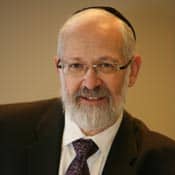Can religion inform society indirectly, transmitting its values even to those who reject its practices? The answer may be found, surprisingly, languishing behind bars in Israeli prisons.
For a number of years, MSNBC's "Lockup: World Tour" series has taken viewers to the inside of penal systems around the world, many of which do not provide much more for their inmates than medieval dungeons. Lockup's first Middle East stop was Israel, where producers found a very different story. The narrator related that one prison he visited resembled a college campus more than a prison. The relationship between inmates and officers was cordial, rather than adversarial; prisoners called officers by their first names. The episode showed prisoners with a good deal of freedom to roam, whole families living together in communal areas with their own kitchens and bathrooms, and a rich variety of educational offerings, including vocational training and degree-granting programs, leading even to a doctorate. Jews and Arabs are housed together, sometimes in the same cell. While anti-Israel forces like to speak of horrid conditions, at least for those convicted of terrorism, one Hamas terrorist has used his smartphone and Facebook page to show off his accommodations, including pets, sports paraphernalia, and music equipment.
Is this good? The data suggests that it is, at least in one regard. While violent crimes like murder and rape are rarer to begin with in Israel, there is no shortage of white-collar and other economic crimes, as well as drug-related activity. But recidivism is about 20 percent less in Israel than in the West. And the show's producers observed that Israeli prisoners on an individual level showed a more optimistic face to the future than they did in the U.S. and Europe.
How did a rehabilitative style win out over the punitive ethos of other prison systems? Israel is progressive in many ways, but also contains subpopulations who are very conservative in their thinking. Bright and cheery prisons also cost a good deal of money, which Israel can ill-afford so long as she must commit a huge part of her national revenue on defense against a score of hostile states poised to destroy her. The answer may be the Bible, as understood by Jewish tradition.
Rabbi Yaakov Galinsky was a powerful orator in his younger days. His booming, commanding voice filled a room, even though when he pulled himself to his full height he still fell short of the five feet mark. A refugee from Hitler's inferno, he pioneered Torah education in the development town of Hadera. He developed a reputation as an entertaining and illuminating lecturer.
Many years ago, I heard him relate how he responded favorably to a request to address the inmates of Israel's largest prison. He exchanged pleasantries with the warden, who then called for someone to take him down to the auditorium.
"You mean you are not coming yourself?" asked Rabbi Galinsky. The warden muttered something under his breath. Rabbi Galinsky pressed on. "I insist. Professional courtesy."
"Professional whaaat?" sputtered the warden. "I'm a warden and you are a rabbi. What profession do we share?"
"I'm not an ordinary rabbi. I'm the head of a yeshiva, a Torah school. Literally, a yeshiva is a place where people sit for a long time. You, too, are the head of a yeshiva; your inmates also sit for a long time. You just keep your charges under lock and key. We both head yeshivas!"
"Funny. But let's get to the point." The warden started getting nervous. "Rabbi. I am not a religious man. You are going to deliver some Torah thoughts. They have nothing to do with me. Why would I want to listen?"
"Because you need some new ideas. You are not doing such a great job here, you know."
"Why do you say that?" The warden took the bait.
"Let me enact a scenario for you. Nineteen-year-old Nimrod walks into his cell for the first time. The veteran prisoners are silent, till the guard leaves. One of them turns to the new arrival, and says, 'Hey, kid! What did they bust you for?' Nimrod lets on that he hot-wired a car and managed to drive it for two hours before getting caught. Immediately, three cellmates explode in laughter. 'You are serving time for something simple and stupid like a joy ride? If you are going to be here, at least let it be for something big.' They proceed to tell him about their exploits in drug-running, grand larceny, and extortion. Moreover, they befriend him. By the time his sentence is up, Nimrod had received quite an education in a variety of illegal occupations. The next time he is locked up, it will be for something far more profitable."
"And you, I suppose, have a better idea?" asked the warden.
"I don't, but the Torah does. The sections on criminal behavior make no mention of prisons. The Torah does, however, speak of how to deal with a thief. According to the Talmud's interpretation—and that is the only one that has legal teeth—a convicted thief can be ordered into a program of contractual servitude to pay off what he has stolen. For six years, he lives with a family. The law specifies that he must be treated as an equal. He must be given the same food, the same clothes, as his boss. If the two are travelling and find a room with only one bed, the servant gets the bad, and the master must sleep on the floor, because to do the opposite would be against the law. For six years, he is treated with dignity—perhaps for the first time in his life. People say 'thank you' to him when he helps. He picks up skills on the job. When he leaves, he is armed with self-respect and a resume." And then Rabbi Galinsky added, "Who do you think is better off? According to our way, the criminal is not treated with a slap on the wrist either. For six years, he loses his freedom, which is punishment enough. And society gets back a whole person."





